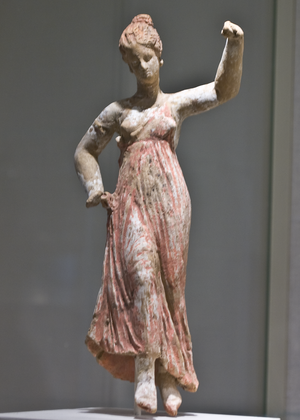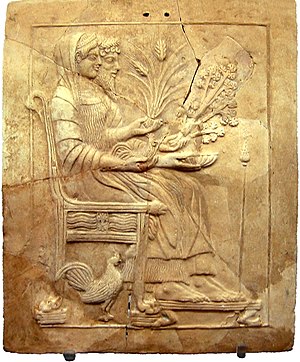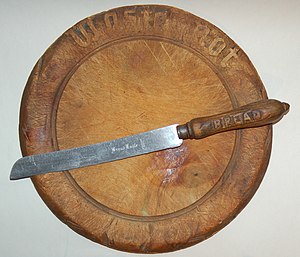There are so many I could talk about!
However, I’m going to talk about my favourite myth regarding M’Lady Morrigan. This story very clearly illustrates Morrigan’s greater function in Irish culture, as well as warning against disrespecting the feminine principle and female power. (Female I use here as an inclusive term not limited to “biology” but including gender expression and identification as well. I use it instead of “woman” because “woman power” sounds really silly, especially when we’re talking about deities.)
Here is a shorter version of the myth, found here.
Cúchulainn attracted the attention of the Morrigan because of his exploits. While sleeping deeply after an exhausting day of single combats, Cúchulainn was startled awake by a great shout. He ordered his charioteer Laeg to get the chariot ready for them to seek out the source of this strange cry.
They travelled north and met a woman riding towards them in another chariot, she wore a red dress, a long red cloak, had red hair and eyebrows and carried a long grey spear. Cúchulainn greeted this woman and asked her who she was, and she replied that she was daughter of a king and had fallen in love with him after hearing about his deeds. Cúchulainn did not recognise the woman as an incarnation of the goddess and brusquely replied that he had better things to do than concern himself with a woman’s love. The Morrigan replied that she had been helping him throughout his combats and that she would continue to do so in return for his love. Cúchulainn arrogantly replied that he did not need the help of any woman in battle. “If you will not have my love and help, then you shall have my hatred and enmity” she said. “When you are in combat with an enemy as good as yourself, I shall come against you in many shapes and hinder you, until your opponent has the advantage.”
Cúchulainn drew his sword to attack this threatening woman, but saw only a crow sitting on a branch. The crow was the totem bird of the goddess and Cúchulainn finally realised that he had rejected the help of the fearsome Morrigan.
On the following day Cúchulainn met a great warrior called Loch in battle. Loch scorned him as a beardless youth and refused to fight him, so Cúchulainn rubbed blackberry juice into his chin until it appeared darkened with a growing beard he also said an incantation over some grasses and they adhered to his chin. Then he found out what it was like to be on the wrong side of the Morrigan. While he was in combat with Loch, she came against him three times. The first was in the shape of a red-eared heifer who tried to knock him over; the second was in the shape of an eel that wrapped itself about his legs as he stood in the stream; and the third time she came against him as a grey wolf that grabbed his sword arm. Each time his opponent gained an advantage and managed to strike Cúchulainn, however he also managed to strike back at the goddess in her forms, he broke the heifer’s leg, he trampled on the eel and poked out the eye of the wolf. In spite of his worsening odds against Loch, he finally managed to kill him with his magical spear – the gae bulga with its thirty barbs.
After he had killed Loch, the Morrigan appeared to him again in the form of an old crone who was milking a cow with three teats. Cúchulainn requested a drink of milk from her, she gave him a drink from the first teat but that did not quench his thirst, so she gave him a drink from the second teat but still his thirst was unquenched and then she gave him a drink from the third teat and finally his thirst was quenched and he was grateful to the old woman and asked what reward she wanted. She requested that he heal the wounds that he had inflicted on her while she was in animal guises as only Cúchulainn could heal the wounds which he caused, which he graciously did.
She appeared to him after that on the day of his death in the form of three old crones who cajole him into eating a piece of cooked dog which was a food forbidden to him, thus he broke a geas which had been imposed on him and this was extremely inauspicious. After he had been killed in the Battle of Muirthemne she appeared as the crow which landed on his shoulder.
This is not my favourite version of the myth, but my internet is being a little sketchy at the moment so it’ll have to do.
I like this myth because it illustrates what happens when one denies Morrigan’s sovereignty. Cuchulainn had power because of Her favour; when he scorned Her he lost everything.
Morrigan is not just a goddess of death and war; She’s the goddess of the life of the tribe itself. The king cannot rule without Her blessing, and Her blessing is given to a fair and just ruler who keeps the tribe healthy and vibrant.
The concept of sovereignty is central to why I am devoted to Morrigan — it’s an issue I have, and I’m sure that’s why She chose me.






